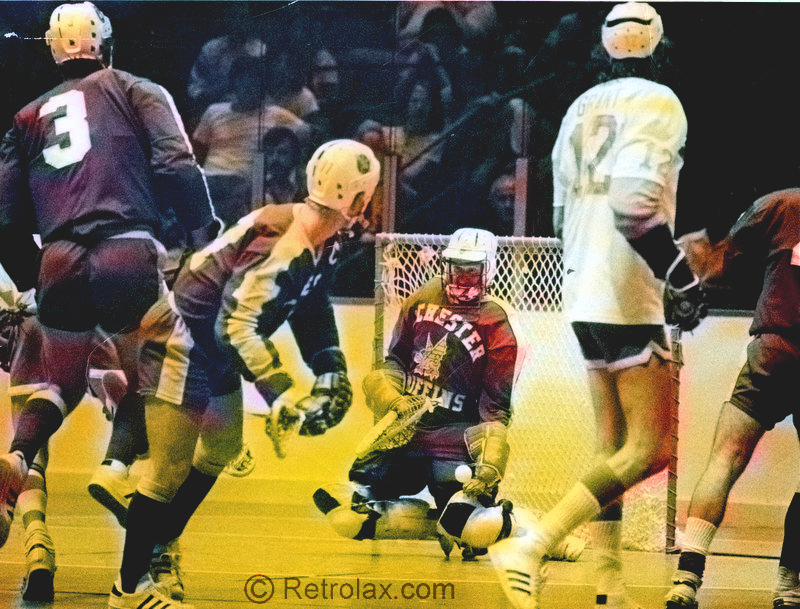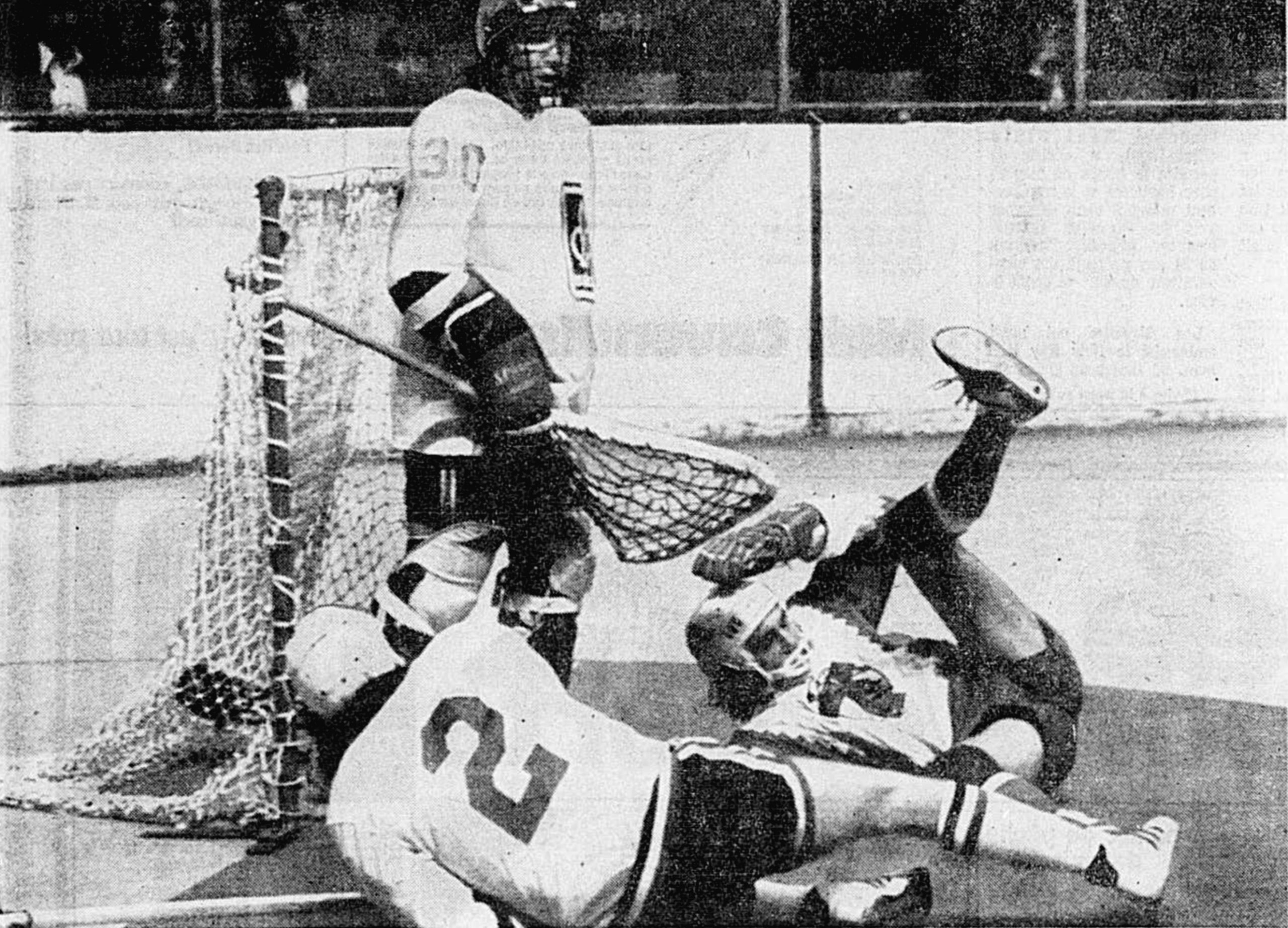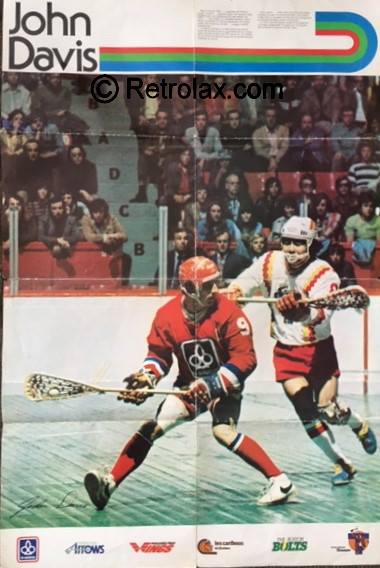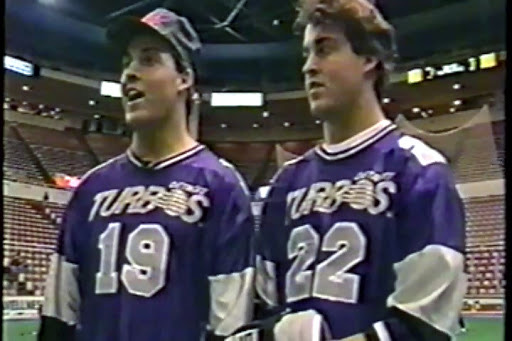CURT SMITH
of the Rochester Democrat and Chronicle
ROCHESTER—Marshall to Parsons to Dudley. These lyrics may not be as poetic as Tinkers [sic] to Evers to Chance, but the Rochester Griffins aren’t complaining.
The Griffins have scored a number of goals this season just that way—on passes from Merv Marshall to Kevin Parsons to Rick Dudley.
They’re three major reasons why the Griffins have been on top or near it during the National Lacrosse League’s first month of play.
Merv Marshall, who returned to lacrosse after a season’s layoff last year, has emerged as one of the NLL’s premier goalies.
Kevin Parsons, Rochester’s No. 1 choice in February’s league draft, got off to a lacklustre start, then began to approach what had been expected of him.
Rick Dudley, given the loudest cheers by Community War Memorial crowds, has been the Griffins’ leading goal-scorer, picking up 20 in Rochester’s first eight games.
There have been other figures involved beside these three. The Griffins have received fine performances from Al Gordaneer, Barry Bartlett, Glen Neuman, Charlie Henderson and Bill Hoculik, to mention just a few.
The club’s depth has allowed them to withstand injuries to several players—Paul Warden, Tom Phair, and Billy Foote, sidelined with a severely injured right eye.
And the Griffins’ fast start has spurred attendance and lacrosse interest in Rochester, where the team averaged 3,500 in its first five games, a total far above pre-season forecasts.
Despite the club’s overall balance, though, it has been Marshall, Parsons and Dudley who have grabbed the bulk of the publicity. And little wonder.
Serious, soft-spoken, unassuming, Marshall in many ways is the exact opposite of the NLL’s more flamboyant goalies.
A free-wheeling, fast break-oriented goaltender on the lacrosse floor, Marshall is studious and deliberate off it.
“Merv’s not flakey; that’s so unlike most goalies,” laughs Griffins’ coach and general manager Morley Kells. “He’s dedicated, almost super-serious. He studies the game constantly.”
Since 1956 Marshall has played in every possible lacrosse level, ranging from minor to junior to senior leagues. During that period he was named most valuable goalie three times and was a Canada Games silver medalist in 1969.
Now 27, Marshall is playing as well as ever. With him around, the Griffins are in secure goalie shape. He has been the difference already in several of Rochester’s games this season.
“Disciplined is the way to describe him,” says Kells. “He waits to make his move, whether facing a breakaway or getting a pass away, then takes advantage of any mistakes the other team commits.
“And when something goes wrong with his game, Merv is like a good golfer. He goes back to the putting green and works and works on what’s going bad.”
Marshall’s career has been varied, beginning when he was nine years old at Huntsville, Ont., under the direction of Jim Bishop.
After playing junior lacrosse there for five years, Marshall moved up to the junior leagues with the Oshawa Green Gaels.
Following five years at Oshawa, Marshall made another jump, to Brooklin, Ont.’s senior club. Then in 1970, he travelled to Windsor, Ont. for a three-year stop with its senior club, the Warlocks.
“I didn’t play last year,” Marshall says. “I moved to Oshawa, was going to play in Brooklin, but their team folded and I was out of luck.”
Then the NLL was born. Marshall was drafted, and the Griffins were all set in goal.
Parsons was the NLL’s No. 1 draft choice in February. He came off a season last year where he was the most valuable player, leading scorer and an all-star in the Western Lacrosse League.
After a fine exhibition season, Parsons encountered a rocky start. He stumbled during the Griffins’ first few games. Kells considered benching him, then switched him to another line.
As Parsons saw more action, though, his play picked up. After seven games, the 6-foot-1, 205-pound centre had scored nine goals and 13 assists.
Parsons had also been involved in several fights which reinforced his image as the team’s ‘policeman.’ The brawls invariably prompted loud ovations from the War Memorial turnouts.
“If Kevin plays up to his potential,” Kells says, “we have the best one-two punch in the league. He and Dudley can really keep the pressure on the defence.
“Parsons has all the physical equipment. All he has to do is put the skills together. I don’t know why he got off to such a bad start; he seemed to be in a fog. He wasn’t a help. I know that.
“But that’s in the past now. He’s straightened out,” Kells continued. “I think he’s up to par.”
While Parsons and Marshall have contributed to the Griffins’ initial success, the club’s top offensive threat and biggest drawing card has been Dudley, who also played last season with the hockey Buffalo Sabres.
Dudley drew repeated ovations from the near-sellout crowd of 6,150 at Rochester’s opening night, and has done little since to dampen the cheers.
He was chosen by the Griffins in a special draft earlier this year, where each NLL club was allowed to draft one player from another professional sport.
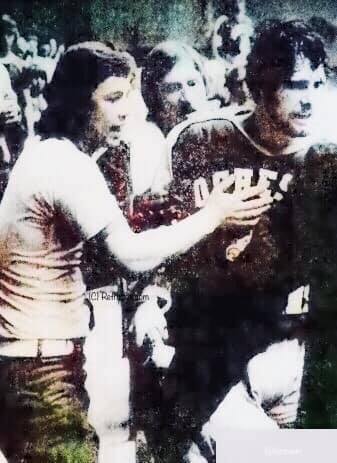
Dudley, 25, scored 13 goals and 13 assists with Buffalo, ranking as the team’s eight-leading scorer. A former Canadian junior lacrosse league performer, Dudley began his hockey career in 1968.
“Dudley is a great attacker,” Kells says. “From what he’s shown, I’d say he’s one of the best one-on-one players in the league.”
In the draft which sent Dudley to Rochester, the Griffins won the right to draft ahead of the other five NLL clubs, and Kells immediately contacted Punch Imlach, the Sabres’ general manager.
“I got together with Punch,” Kells recalls. “I’ve known him for quite a while. The fact that we’re friends helped speed negotiations along.”
To land Dudley for the summer, the Griffins had to sign a special contract with Buffalo. If Dudley is injured playing box lacrosse, and his hockey career jeopardized, Rochester must pay his Sabres’ contract.
In effect, the Griffins’ acquisition of Dudley is in payment for a favor Kells did for Imlach in 1971, when he recommended the Sabres sign Dudley as a free agent.

